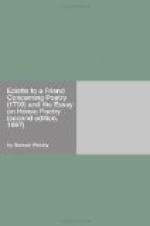but it’s so unnatural, that an ingenious Person
may find much more pleasure in reading a worse Poet.
Besides, his Stanza’s often cramp the Sence,
and injure many a noble Thought and Passion.
But Mr. Cowley’s Davideis is the Medium between
both; it has Gondibert’s Majesty without his
stiffness, and something of Spencer’s Sweetness
and Variety, without his Irregularity: Indeed
all his Works are so admirable, that another Cowley
might well be employ’d in giving them their
just Elogy. His Hero is according to the ancient
Model, truly Poetical, a mixture of some Faults and
greater Virtues. He had the advantage of both
Love and Honour for his Episodes, nay, and Friendship
too, and that the noblest in History. He had all
the sacred History before him, and liberty to chuse
where he pleased, either by Narration or Prophecy;
nor has he, as far as he has gone, neglected any advantage
the Subject gave him. Its a great Loss to the
World that he left the Work unfinish’d, since
now he’s dead, its always like to continue so.
As for Milton’s Paradise Lost its an Original,
and indeed he seems rather above the common Rules
of Epic than ignorant of them. Its I’m sure
a very lovely Poem, by what ever Name it’s call’d,
and in it he has many Thoughts and Images, greater
than perhaps any either in Virgil or Homer. The
Foundation is true History, but the turn is Fable:
The Action is very Important, but not uniform; for
one can’t tell which is the Principal in the
Poem, the Wars of the Angels or the Fall of Man, nor
which is the Chief Person Michael or Adam. Its
true, the former comes in as an Episode to the latter,
but it takes up too great a part thereof, because its
link’d to it. His Discourse of Light is
incomparable; and I think ’twas worth the while
to be blind to be its Author. His Description
of Adam and Eve, their Persons and Love, is almost
too lively to bear reading: Not but that he has
his inequalities and repetitions, the latter pretty
often, as have, more or less, all other Poets but
Virgil. For his antique Words I’m not like
to blame him whoever does: And for his blank Verse,
I’m of a different mind from most others, and
think they rather excuse his uncorrectness than the
contraries; for I find its easier to run into it,
in that sort of Verse, than in Rhyming Works where
the Thought is oftner turned; whereas here the Fancy
flows on, without check or controul. As for his
Paradise Regain’d, I nothing wonder that it has
not near the Life of his former Poem, any more than
the Odysses fell short of the Iliads. Milton,
when he writ this, was grown Older, probably poorer:
He had not that scope for Fable, was confin’d
to a lower Walk, and draws out that in four Books
which might have been well compriz’d in one:
Notwithstanding all this, there are many strokes which
appear truly his; as the Mustring of the Parthian
Troops, the Description of Rome by the Devil to our
Saviour, and several other places.
And now I’ve done with all the rest, I may take liberty to say something of my own.




